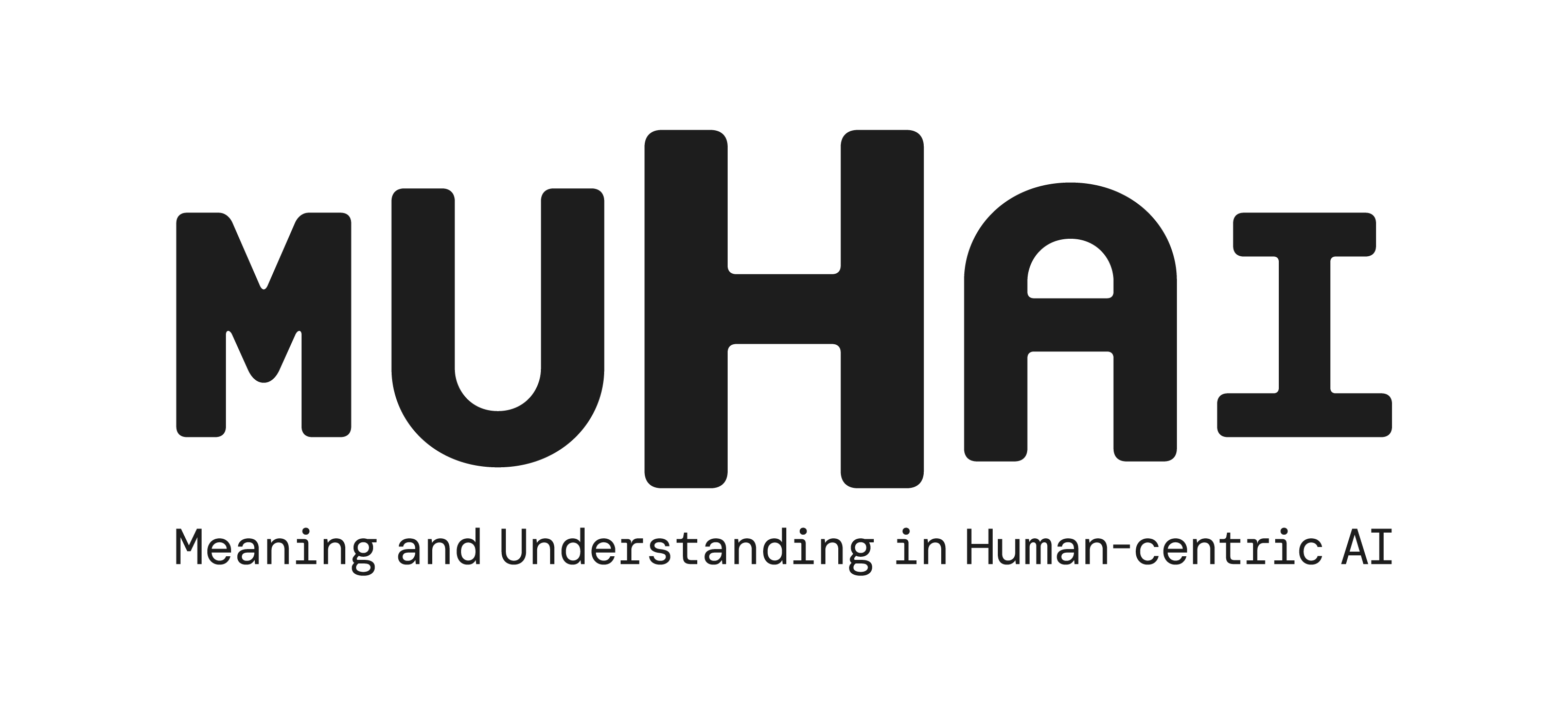
MUHAI - Meaning and Understanding in Human-centric AI is a 4-year Horizon 2020 project (2020-2024) funded by the EU FET 'Boosting emerging technologies' (FETPROACT-EIC-05-2019). VIU is partner with Professor Luc Steels as MUHAI Scientific Coordinator and as leader of the Communication, Dissemination and Ethics WP.
MUHAI works on developing Human-Centric Artificial Intelligence (AI) in a pivotal moment of AI tools diffusion. Its findings open doors regarding the meaning we human assign to reality and how to pass it to machines, to better our lives.
Meanings are distinctions (categories) that are relevant for prediction, classification, communication, problem solving or other mental tasks. The meaning of an experience include the events, actors, entities and what roles they play, the temporal, spatial and causal relations between events, the intentions, goals, interests, and motivations of the actors, and the values and emotions that implicitly underlie their behavior. Understanding is the process of constructing meaning by casting episodic events into coherent narratives that explain experiences and allow them to be integrated into a Personal Dynamic Memory.
Project partners bring to the table the enormous advances in recent years in technical AI components (such as deep learning networks), semantic resources (such as knowledge graphs) and simulation engines (as developed for VR - virtual reality). They are developing working and, hopefully, marketable demos that are part of broader outcomes encompassing theoretical research.
The scientific production is so far rich and relevant, with papers featured in major AI events around the world. If you are science-thirsty you can visit the dedicated 'Paper' section in MUHAI website, where you'll also find the first of the three volumes gathering the main research outputs.
These outcomes are innovative breakthroughs related to the nature and functioning of Personal Dynamic Memory, integrate them within human-centric AI systems, and systematically test them in two challenging human-centric case studies emphasizing AI for the common good: (i) learning common sense every day pragmatic knowledge required in everyday activities, and (ii) collaborative support for historical and social science research when constructing narratives to understand past and current social developments, in particular the origins and persistence of inequality in our society.
The project investigates also ethical issues of AI use and promoted a trustworthy relationship with AI using emotional communication and aiming at translating complex topics in a comprehensive way. The project advances the reflection on ethics related to the use of AI enabling discussions with the industry, policy makers and the general public.
Information is shared with the media and all partners are participating in cultural meetings and educational activities. Furthermore, a set of blog entries and catchy campaigns are created, to engage the wider publics. An example is the Word Of The Month (WOTM) campaign: in order to familiarize the public with the terminology employed by AI researchers, a MUHAI vocabulary is created and made available on the MUHAI website and in the social media campaign. Have a tour and learn the slang of the AI gang!
To look ahead: AI is a major evolution in human’s use of technology and MUHAI is opening up doors for future research, but what makes AI researchers tick? During MUHAI researchers were asked to reveal what they look forward to in the FutureAI section.
Project website: www.muhai.org
To stay updated, please visit the project website, follow our social and subscribe to the Newsletter!
For further information on MUHAI Project please contact Alessandra Fornetti, Executive Director of the TEN Program on Sustainability at alessandra.fornetti@univiu.org
List of participants:
|
1. |
Universitaet Bremen |
Germany |
|
2. |
Stitchting VU |
The Netherlands |
|
3. |
Venice International University |
Italy |
|
4. |
Vrije Universiteit Brussel |
Belgium |
|
5. |
SONY Europe BV |
The Netherlands |
|
6. |
APICBASE NV |
Belgium |
The University of Bremen (UHB) is MUHAI project Coordinator.
MUHAI Scientific Board Members:
Walter Daelemans (University of Antwerp)
Kerstin Fischer (University of Southern Denmark)
Andrea Baronchelli (City University of London)
MUHAI Stakeholders:
SAP (Vanessa Micelli)
Telefonica Innovacion Alpha (Tarek Besold)
International Institute of social History Amsterdam (KNAW, the Netherlands)
 This project has received funding from the European
This project has received funding from the European
Union’s Horizon 2020 research and innovation
programme under grant agreement No. 951846






















